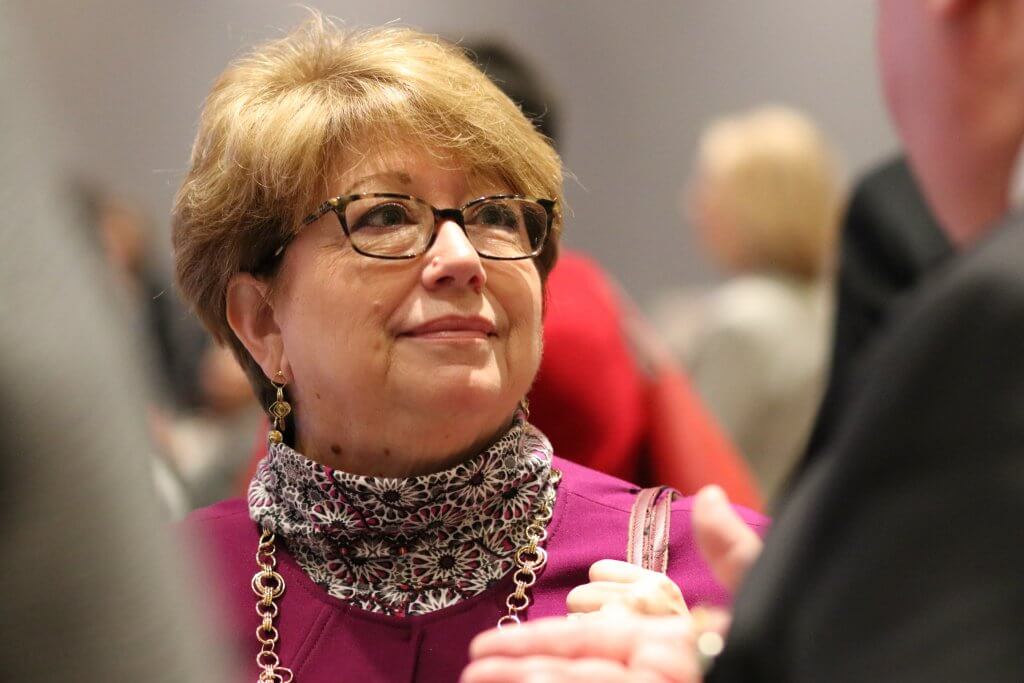Report on possible changes in judicial selection process pushed back to 2025 session

The ongoing debate over the wisdom of utilizing contested elections to choose Maryland’s nearly 175 circuit judges dates back more than a half-century — and it’s now destined to stretch into future legislative sessions.
A workgroup created by Maryland’s judicial branch 18 months ago to undertake studies and conduct hearings on how best to choose judges was originally scheduled to present its report to the General Assembly at the outset of this year’s session.
But completion of the report has been delayed, and it won’t be presented to legislators until the runup to the 2025 legislative session, according to Montgomery County Circuit Court Judge Kathleen Dumais, who co-chairs what is formally called the Legislative Committee Workgroup to Study Judicial Selection.
In an interview, Dumais said the report is “85% completed.” She attributed the delay in completion to “many of the members of my workgroup, as well as myself, [having] been involved in some of the other legislative matters” being considered in the current session.
The Maryland judiciary’s top legislative priority this year has been passage of a measure enhancing personal security for judges, following the fatal shooting of Washington County Circuit Court Judge Andrew Wilkinson by a disgruntled respondent in a divorce case last fall. The bill passed the Senate 43-1 earlier this month, while the House version awaits action by the Judiciary Committee.
Dumais said the revised schedule for the judicial selection workgroup calls for completion and final approval early this spring of the report by the group, which is co-chaired by retired U.S. District Court Judge Alexander Williams and consists of representatives of interested organizations as well as attorneys and current and retired judges. The report will then be forwarded for review by the Maryland judiciary’s full legislative committee and state Supreme Court Chief Justice Matthew Fader.
Once that process is finished, “we will certainly start distributing the report and we will begin preparations for introducing a bill in the 2025 legislative session,” Dumais said. “And in the interim, we hope to have the opportunity to educate and talk to as many legislators and legislative groups as possible.”
While the report of the judicial selection workgroup is expected to encompass a number of issues — including the composition and transparency of the nominating commissions that vet applicants for judicial appointments before making recommendation to the governor — the question of whether circuit court judges should continue to face contested elections has been at the forefront of the group’s deliberations.
Creation of the workgroup in the late summer of 2022 was the latest development in a perennial debate over whether to retain the constitutional requirement that circuit court judges run in partisan primary and general elections for 15-year terms, after initially being appointed by the governor. In contrast, the state’s nearly 125 district court judges are confirmed by the Maryland Senate to 10-year terms with no elections involved; judges on the Maryland Supreme and Appellate courts likewise receive Senate confirmation for 10-year terms, and face only nonpartisan “yes or no” retention votes at the ballot box when their terms end.
The judicial selection workgroup’s deliberations also have encompassed how best to institute a judicial performance evaluation system — now utilized in Colorado and a handful of other states — to help voters assess judges in Maryland’s retention elections, where there is currently little information and guidance available. The imperative for such an evaluation regimen would intensify if the current system of retention elections for appellate judges is extended to trial judges at the circuit court level.
Prior to being appointed to the bench in late 2021, Dumais spent two decades as a Democratic member of the House of Delegates — including eight years as vice-chair of the Judiciary Committee — and was an advocate of doing away with judgeship elections. It appears that her position is shared by a majority of the judicial selection workgroup, and is expected to be part of the final report.
But several workgroup members — notably Baltimore attorney William “Billy” Murphy, a onetime circuit court judge — remain skeptical of doing away with contested elections, which traditionally have been viewed by minority groups as a political fail-safe to ensure diversity among the judiciary. Those advocating doing away with judicial elections will face the challenge of convincing skeptics within groups such as the Legislative Black Caucus of Maryland of the wisdom of such a move.
Maryland Senate President Bill Ferguson (D-Baltimore City) also remains dubious, due to similar concerns. Appearing before a group of Democratic activists in Montgomery County this past fall, Ferguson acknowledged that “it doesn’t make a lot of intuitive sense” for judges to be running in contested elections. “However, Maryland has a long history,” Ferguson added. “And unfortunately, in a number of our counties, we have not a great history when it comes to having a bench that is diverse and represents the people.”
In response to such arguments, advocates of doing away with judicial elections have contended that, even prior to the election of Democrat Wes Moore, the state’s first Black governor, in 2022, recent governors — both Democratic and Republican — have moved to increase the racial and gender diversity of circuit courts in making appointments from lists of names sent to them by trial courts nominating commissions around the state.
A racial and ethnic breakdown compiled by the judicial selection workgroup in late 2022 found that nearly 30% of circuit court judges in the state were of African-American descent, roughly equal to the overall percentage of Maryland’s Black population. Judges of Hispanic origin didn’t fare as well: Less than 2% of circuit court judges were Hispanic, in a state that is about 10% Latino.
There also have been conflict-of-interest concerns raised about the current system of contested elections: During a public hearing held by the judicial selection workgroup in late 2022, several witnesses suggested that contributions flowing into judicial campaigns from law firms with interests before the court created at least a perception that impartial decision-making is being compromised.
Vetting of candidates for circuit court by trial court nominating commissions prior to be initially appointed by the governor dates back more than 50 years, to an executive order issued by then-Gov. Marvin Mandel (D) that has been renewed by all governors since. For about 30 years following the 1970 executive order, electoral challenges to “sitting judges” placed on the bench via gubernatorial appointment were rare.
However, since 2002, there have been more than a dozen instances of sitting judges losing contested races for a full 15-year term after their initial appointment, with four incumbents being ousted in 2020 alone. This year, the May primary elections will feature sitting judges in four of the “Big Eight” counties — Anne Arundel, Baltimore County, Montgomery, and Prince George’s — facing challengers, along with a contentious southern Maryland circuit court race in in St. Mary’s County.
The increasing instance of such challenges at the ballot box has prompted concerns in some quarters that qualified applicants would be increasingly reluctant to seek circuit court these judgeships if it meant subjecting themselves to often bruising political campaigns.
Any change that does away with contested elections for these judges, if approved by the General Assembly, would require a change in the state constitution, and would have to be placed before the rank-and-file electorate. With the delay in the judicial selection workgroup report, the earliest potential date for such a vote has been bumped from this year to November 2026.




 Creative Commons Attribution
Creative Commons Attribution